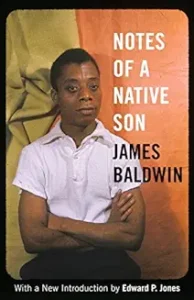Notes of a Native Son by James Baldwin 1955
James Baldwin (1934-1987) was one of the most articulate, angry, and influential Black writers of the mid-20thC. I first encountered his remarkable ‘The Fire Next Time’ in 1963 when it was among the required reading books for freshman entering Harvard that fall.
This collection of ten essays which originally appeared in Harper’s, Partisan Review, and the New Leader was listed as #19 on the Modern Library’s list of the 100 best non-fiction books of the 20th C.
In some ways, the essays feel dated as he refers to ‘Negroes’ and describes his experiences as a student in post-WWII Paris and his winters living in a small village in Switzerland. The pre-internet differences in culture, customs, and racial relations felt very different from today. In other ways, however, Baldwin’s anger about the Black male’s need to live two different lives, the one true to himself while also living the nightmare of being trapped in America’s racial tensions. Baldwin describes the need to act based on“the American Negro’s education that he must make people ‘like’ him. This smile-and-the-world-smiles-with-you routine worked about as well in Paris as it had in the situtation for which it was designed, which is to say that it did not work at all.” This description of the double life a Negro had to live is very similar to W.E.Du Bois’ ‘veil’ which he characterizes the need to behave in a false way in his ‘Souls of Black Folks’ book of 1903.
Baldwin is angry, what he refers to as ‘the rage of the disesteemed’ and while in 1963 he finds that in some respects, the lot of Black people in America has improved from the horrors of slavery and Jim Crow, he concludes his final essay with the observation that “One of the things that distinguishes Amerians from other people is that no other people has ever been so deeply involved in the lives of black men, and vice versa. This fact faced, with all its implications, it can be seen that the history of the American Negro problem is not merely shameful, it is also something of an achievement. For even when the worst has been said, it must also be added that the perpetual challenge posed by this problem was always, somehow, met. It is precisely this black-white experience which may prove of indispensable value to us in the world we face today. This world is white no longer, and it will never be white again.”
Seventy years later, Baldwin’s predictions are largely true. America has had a Black president and Blacks are present in leadership roles in board rooms, university presidents’ offices, the Cabinet and Congress, and yet, we continue to face racism (e.g. George Floyd), violence, and persistent inequality. All these years later, reading Baldwin remains informative and important.



